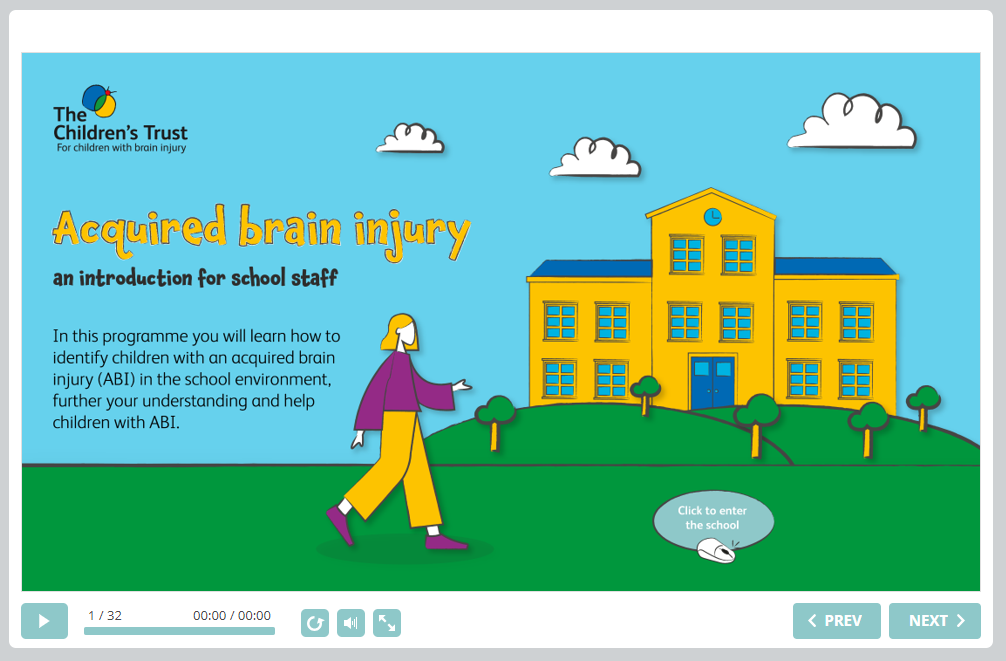
Charity offers vital help for teachers to better understand brain injury
With one child in every classroom affected by a brain injury (N-ABLES 2019), neurorehabilitation experts from The Children’s Trust have launched an innovative programme to increase awareness and understanding of the condition.
Written from a teacher’s point of view, and delivered through 30-minute interactive sessions which take the user through the school environment, the programme will present some of the challenges a child with a brain injury may face during the school day. This may include; fatigue, difficulty forming and keeping friendships and difficulty remembering instructions.
The free introductory session, funded by the Constable Education Trust, is set in the context of the school and classroom and aimed at those with little or no knowledge of acquired brain injury (ABI). The charity will also be introducing a follow up session for those who wish to gain a deeper understanding of childhood brain injury.
It’s important to remember even concussion is a type of brain injury that can alter the way a child’s brain functions. The symptoms of a concussion can be very subtle and not always immediate. This means that a teacher could easily overlook the signs that a child or young person has had a concussion. It is therefore important to ensure that teachers, parents and anyone who cares for the child is aware of any recent bumps or accidents so that they can look out for warning signs.
Katy James, Head of Community Services Transformation at The Children’s Trust, comments: “Many children and young people with an acquired brain injury return to school with a range of cognitive, behavioural, psychosocial, and physical difficulties that can affect their academic studies and daily life.
“In some cases, a brain injury can be hidden and as a result often missed or misattributed to other causes, so the right support is not provided. Without the right support, children with ABI are at risk of increased mental health difficulties, reduced education and employment opportunities, antisocial behaviour and involvement in the criminal justice system2. For this reason, it’s very important to not only make sure we provide teachers with the knowledge and tools to fully support a child but also to help them recognise when a child is struggling as a result of their brain injury.”
The All-Party Parliamentary Group ‘Time for Change’ report published in 2018 highlighted that education professionals have difficulty identifying what specific educational support is needed following acquired brain injury and there is an overall lack of awareness and understanding of the condition. The Children’s Trust hopes its targeted programme addresses this need, its consequences and its impact on learning.
Tyler was diagnosed with a brain tumour at age eight. Following surgery, chemotherapy and radiotherapy, Tyler was doing well and had returned to school. As Tyler moved to secondary school, her difficulties with memory, fatigue, concentration and balance became more apparent. She felt increasingly isolated and was quickly losing confidence. The Brain Injury Community Service (BICS), delivered by The Children’s Trust, supported Tyler with secondary school, ensuring she received the right assistance in class and input from local therapy teams so that she continued to improve.
The Children’s Trust mission is to ensure every child and family affected by an acquired brain injury receives good information, advice and support, wherever is appropriate and at the time of need. To find out more about the session, visit: www.thechildrenstrust.org.uk/teachers
ENDS
References:
- N-ABLES 2019
- Hoofien et al. 2001, Williams et al. 2015
For interviews or pictures, please contact The Children’s Trust press office on 01737 365865 or email pressoffice@thechildrenstrust.org.uk.
About The Children’s Trust
Every year 40,000 children in the UK are left with a brain injury as a result of an accident or illness and many have to live with ongoing, long-term difficulties. The Children’s Trust gives children and young people with brain injury and neurodisability the opportunity to live the
best life possible, by providing specialist rehabilitation, education and community services across the UK. www.thechildrenstrust.org.uk
